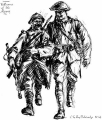 the Archive of World War 1 Photographs and Texts
the Archive of World War 1 Photographs and Texts

Aftermath of World War 1
Austro-Hungarian Empire
The Austro-Hungarian Empire ceased to exist as a direct consequence of its defeat in World War 1. The dual monarchies that made up the core of the Empire, Austria and Hungary, separated and the rest of the imperial territories (most significantly Czechoslovakia) gained independence.Before the war, the Austro-Hungarian Empire was geographically the second largest country in Europe after the Russian Empire, and the third most populous (after both Russia and the German Empire). By war's end, the territories of the Austro-Hungarian Empire had fragmented into a dozen petty states.
But the boundaries of the new countries that were created by the collapse of the Austro-Hungarian Empire were fictions created by the politicians of the victorious countries. Czechoslovakia and Yugoslavia were created as a result of the peace treaties, but they were an uneasy conglomeration of often warring ethnic elements. These failed states would help create instability throughout the region in the decades leading to World War 2
Italy
The Kingdom of Italy gained territory as a result of its victory over the Austrians. The Italian City of Trieste as well as part of what is now Slovenia were added to the Kingdom. Italy also gained several islands off the coast of Turkey at the expense of the deceased Ottoman Empire.Italy was one of the victorious allied powers, but though she had fought bravely and suffered enormous casualties in the war against the Austrians, Italy did not gain everything that she had sought. Many areas along the Dalmatian coast (which had been promised to Italy by Britain and France in the Treaty of London to induce Italy to join the war), where the population was primarily ethnic Italian remained outside of its control and remained the object of its military ambitions. For the most part, Italy did not gain significant territories as a result of the war, though parts of Northern Italy were liberated from Austrian rule. As a result, many Italians felt cheated by the other allies and nursed a resentment toward France and England. At the same time, the Italian victory gave Italians a false sense of confidence and fueled their imperial ambitions. Many Italians wished to restore Italy to its former imperial glory and reestablish the Roman Empire. Not long after the war, Italians would choose Mussolini to lead them to imperial glory. Instead, he embroiled them on the losing side of World War 2 and Italy would be stripped of its colonies in Africa, and occupied by the American and British.